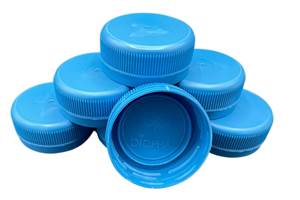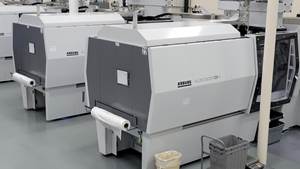Bring On Your PCR
Lots of news lately on expanded use of postconsumer resin (PCR) in products and packaging, including updates from APR, KW Plastics and Landmark Plastic.
There’s a couple of new items related to postconsumer resin (PCR) that I’m grouping together in one blog article. So here we go:
The Association of Plastic Recyclers (APR) has been busy. Recently, they announced their partnership with European associations to serve as a coordinated industry voice to create a Global Plastics Protocol. Now APR is also launching a new program designed to expand market demand for recycled resins and improve plastic recycling in North America.
Called the APR Recycling Demand Champion Campaign, the program will work to increase the use of post-consumer polyolefins. APR’s focus is on “Work in Process” (WIP) items used in manufacturing. These include everyday industrial applications such as trash cans, pallets and tote boxes.
Demand Champions will sign a letter of intent to identify and use these WIPs in their facilities and require PCR content in them. As the program adds more participants, APR believes this will increase the demand for post-consumer recycled polyolefins.
“This program will drive demand for broad specification PCR produced from mixed residential plastics,” explains Liz Bedard, director of the APR Rigid Plastic Recycling Program. “We have identified potential end markets for PCR in WIP durable goods such as crates, tote boxes, cans, pails, drums, trash or recycle bins, pallets, transport packaging and other items.”
“We know there are increased environmental and economic benefits that come from recycling, but only if the materials recycled are made into new products or goods,” says Steve Alexander, president of APR. “Any company looking to catalyze those benefits can have a positive impact on the recycling system by directing those recycled resins into WIP goods that they are already purchasing on a regular basis.”
APR will work to expand participation in this program in partnership with brand owners, retailers, trade organizations, and other members of the recycling value chain. “We welcome any company to join the Demand Champion program,” adds Alexander.
The initial Recycling Demand Champions are: Berry Global, Campbells Soup Co., Coca-Cola North America, Envision Plastics, Keurig Green Mountain Inc., KW Plastics, Merlin Plastics, Plastipak/Clean Tech Inc., The Procter & Gamble Co. and Target Corp. Participating companies will regularly report progress updating their increased use of PCR in these areas, so positive impacts expanding and increasing the use of PCR may be anonymously aggregated and collectively reported.
Target recently became the first major retail member of APR. This completes APR’s engagement across the full supply chain of materials: MRFs, equipment suppliers, recyclers, converters, consumer brand companies, and retailers.
Sounds like an interesting program and I’ll be sure to provide you all with updates as they come in.
KW Plastics Receives LNO For HDPE PCR
KW Plastics, the world’s largest plastic recycler of high density polyethylene and polypropylene, announced it has received a no objection letter (LNO) from the U.S. Food and Drug Administration’s Center of Food Safety and Applied Nutrition for KWR101-150, a natural postconsumer high density polyethylene resin.
The FDA letter confirms the resin is cleared for Conditions of Use E-G for levels up to 100% content. This additional clearance is in addition to its previous conformance to REACH/SVHC, CONEG, and UL 94HB.
According to Pedro N. Morales, director of sales and marketing:
“This new regulatory accomplishment permits KW to fully support our brand owners and processors, who are focusing on expanding the use of PCR to many rigid packaging applications where FDA food contact is required.”
While KW Plastics has produced HDPE Natural blow made-grade resins for over 25 years, this expanded clearance will offer the additional benefit of a food-contact safe resin, while offering economic and resource management savings.
“With KWR101-150, our processors will only have to inventory one natural HDPE PCR for both their FDA and non-FDA compliant applications. Thus, our customers can expect a reduction in resin inventory costs, storage and logistics requirements. KW will not be charging a premium for this FDA compliant material,” Morales said.
The application and testing process was approximately a two-and-a-half year pursuit that KW executives believe will add value and volume to the postconsumer resin supply chain.
“KW invested the research and development towards this resin so that we can better serve our customers and meet their demand for more sensitive applications such as Personal Care items that require FDA resin. We can now offer a PP and natural HDPE resin in our FDA portfolio,” says Scott Saunders, general manager for KW Plastics Recycling Division.
While KW has received a total of three (3) LNOs for its postconsumer resins, this is the first LNO for HDPE. Two prior FDA letters of non-objection have been received for KW’s PP PCR resin family, consisting of KWR621FDA, KWR621-20FDA, and other grades to be commercialized.
November On Site
In keeping up with the PCR trend, be sure to check out my November On Site article, which features my visit with Landmark Plastic, an Akron-based processor that uses millions of pounds of recycled plastic each year to produce packaging for the horticultural market.
Related Content
PHA Compound Molded into “World’s First” Biodegradable Bottle Closures
Beyond Plastic and partners have created a certified biodegradable PHA compound that can be injection molded into 38-mm closures in a sub 6-second cycle from a multicavity hot runner tool.
Read MoreLatest Data on Bottled Water Shows Continued Strong Growth
Bottled water’s volume surpassed soft drinks for the first time in 2016 and has done so every year since.
Read MoreConsistent Shots for Consistent Shots
An integral supplier in the effort to fast-track COVID-19 vaccine deployment, Retractable Technologies turned to Arburg and its PressurePilot technology to help deliver more than 500 million syringes during the pandemic.
Read MoreImpacts of Auto’s Switch to Sustainability
Of all the trends you can see at NPE2024, this one is BIG. Not only is the auto industry transitioning to electrification but there are concerted efforts to modify the materials used, especially polymers, for interior applications.
Read MoreRead Next
Making the Circular Economy a Reality
Driven by brand owner demands and new worldwide legislation, the entire supply chain is working toward the shift to circularity, with some evidence the circular economy has already begun.
Read MoreLead the Conversation, Change the Conversation
Coverage of single-use plastics can be both misleading and demoralizing. Here are 10 tips for changing the perception of the plastics industry at your company and in your community.
Read MoreBeyond Prototypes: 8 Ways the Plastics Industry Is Using 3D Printing
Plastics processors are finding applications for 3D printing around the plant and across the supply chain. Here are 8 examples to look for at NPE2024.
Read More


























